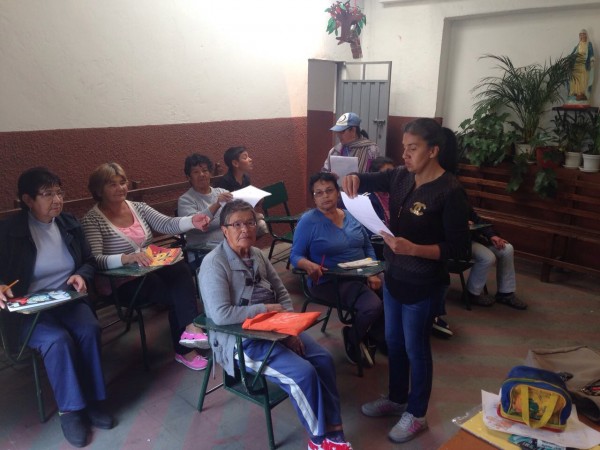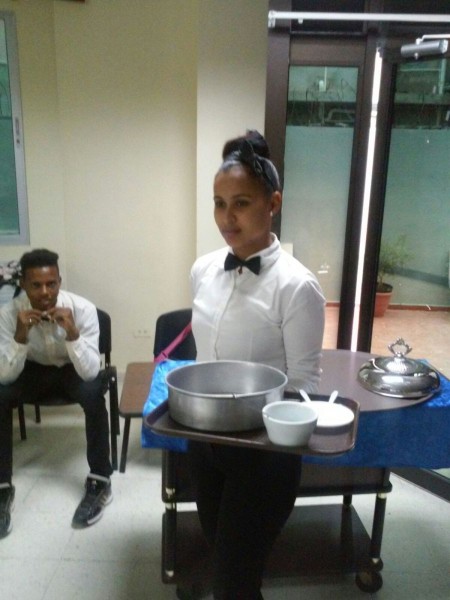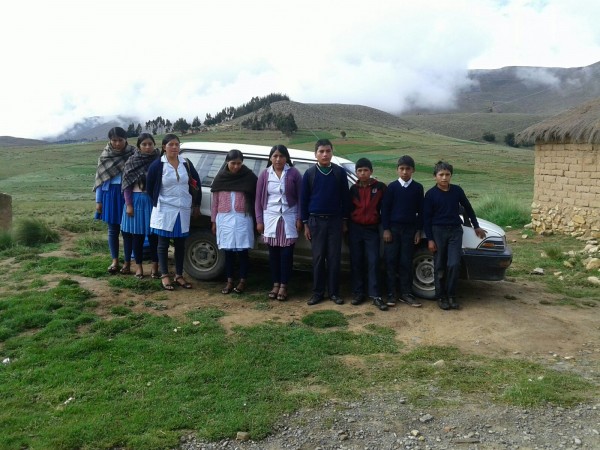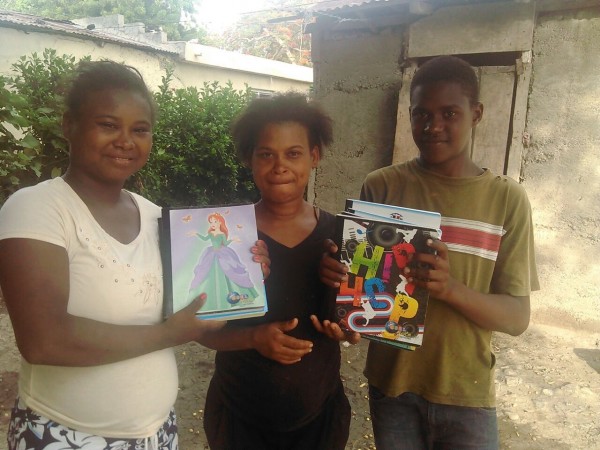At the beginning of this year, Saint Lucy Parish School, in Racine (Wisconsin) did a “penny competition” to raise funds for the children of La Sagrada Familia parish in the Dominican Republic. At the end of the fundraising $1,500.00 were collected for the Pennies for Pencils Program.
Every year, at the beginning of the school year in the Dominican Republic, many families have difficulties to pay for the school materials and uniforms of their children. It is so hard for them to obtain these goods that as a result many kids start the school a few weeks late, when finally their families have the opportunity to buy the materials for them. With the help from Saint Lucy, La Sagrada Familia Parish has been able to give notebooks, pencils and uniforms to some of our neediest children. From here we would like to thank the school children of Saint Lucy for helping children in the Dominican Republic to go to school!!
The CSP begins a new program for senior citizens in El Pesebre neighborhood of the Colombian capital

Last August we informed in this blog that the Community of St. Paul had started an after-school program for children in El Pesebre neighborhood in Bogotá. This program has a double goal: first, to help academically children aged 8 to 12 who need assistance with their studies; secondly, to offer them a safe environment where they can go in the afternoons and thus avoid that, by being on the street, they may fall into consumption of drugs. The project has been functioning with normality since its beginning. What we never expected was that such a program would be the trigger for another one: seeing that the parish facilities of the neighborhood opened several afternoons a week for the children, a few senior citizens came to us with a simple petition: «Can you teach us as well?»
It turns out that several grandparents in the district, who were born in rural provinces of the country and moved to Bogotá many decades ago, have had a long life of hard work and have never had the time to care for their intellectual formation. Some are illiterate, others know how to read and write, but barely, and do not have many knowledge of mathematics, history, geography…
We searched for a teacher from the same area willing to take on this task, and at the beginning of March we opened our new Educational Program for the Elderly. It operates every Saturday morning, and a dozen of grandmothers (they seem to be more interested than the men!) and one grandfather are already enrolled. They do not miss one class, are very attentive (in fact, they take their studies very seriously). For us it is a real joy to see them week after week, sitting in their desks and learning so many things that when they were children never had the opportunity to study.
The Community of St. Paul promotes the formation of youth in the field of tourism in the rural community of Barrera, Azua (Dominican Republic)
Margarita is twenty years old, and two years ago she finished her secondary education. Since then, she had “done nothing”, as she puts it. Arriving in her town, Barrera, one sees a magnificent beach called La Caobita. An imposing mountain, the Cerro de Martín García, rises behind the houses. The result is that the town is hemmed in between the sea and the ridge and the town becomes significantly isolated; no one goes there on the way to somewhere else: either you go to Barrera for a reason, or you do not go there at all.
The lack of sources of income is the reason that the people of this community, who earn their livings mainly from agriculture, fishing and the illegal burning of coal, have many unmet needs. The Community of St. Paul tries to make connections between the youth of the communities like Barrera, much needed of professional training, and existing resources in the country. Specifically, we have been making progress with INFOTEP, the government’s National Institute of Professional Formation, which offers a wide variety of options to train people, and it is especially concerned with vulnerable groups, that is, those who have not finished primary studies. A few months ago, and after several meetings, we were able to convince INFOTEP trainers to travel to Barrera to develop an entrepreneur course there. The goal was to improve the small businesses that already exist in town, and to promote new ones. Now that the course has ended, the CSP will offer the option of earning micro credits for those who participated in the entrepreneur course.
A couple of months ago, they also initiated a tourism course. It’s well known that tourism is an important source of income in the Dominican Republic. Unfortunately, tourism has barely reached the Southwest of the country, which includes the province of Azua. The beautiful Caobita beach, with its delightful mangrove swamps, is little known. We hope that, in the future, the region can be developed for tourism, benefiting the inhabitants of this area. Therefore, we have promoted a tourism course, which is composed of various units, including restaurant waiter, bartender, and maître. Thirty youth travel every weekend to Azua, the province capital, which is also the regional office of INFOTEP, to attend this course.
But to achieve this goal has not been easy. As we said, Barrera is an isolated community whose inhabitants have scant resources. They live hand to mouth, and we knew that it would not be easy to find the resources for everyone to go to Azua for their training. We looked for an alternative, which led to a meeting with the school leadership. We asked for transportation for the youth on the bus that is owned by the school. We also met with the town’s mayor, who promised to provide the gas for their travels. Finally, it was agreed that the youth would pay the driver’s expenses, so that they could travel on Saturday and Sunday to finish the course.
They have now finished the first unit, and dream about the ones to follow. They have even asked INFOTEP to offer an English class. Margarita, like all of the others, is excited. The CSP, through our own scholarship program, offers an additional incentive for them to finish the INFOTEP course: university scholarships for the two most conscientious students, to study tourism at the College level, after INFOTEP. Will Margarita be one of the two recipients?

A van for 23 students allows young men and women from Totora Pampa (Bolivia) to study without impediments

The journey of some students from Totora Pampa —in the high lands of Cochabamba— to their school is now much shorter: until recently, they had to walk two hours from their homes to their classrooms, and now they reach their destination in less than 30 minutes! For these students, the only chance to go to secondary school was by undergoing a tiring and dangerous walk, (especially for the girls), six miles each way, at an altitude of more than 10,000 feet. In such a climate, even a simple cold would make the walk of these youth to their school very hard.
To face this problem, we talked with those living in that rural area about the possibility of hiring a van to cover that journey, and finally the dream came true. A vehicle was hired to help with the transportation of 30 students, each family being responsible for a portion of its service’s cost. Thanks to the van, now the students arrive on time, safely and comfortably to the school. They also can save plenty of time to dedicate it to study and other domestic chores, which are always important in families where each hand counts. The say, happily… “Let’s go to school… but by car, please!”
The Community of Saint Paul starts an after school program in Pesebre, a neighborhood in the south of Bogotá
Since last January, members of the CSP have worked in La Resurrección Parish, located in the southern part of Bogotá. The parish territory includes La Resurrección, Granjas de San Pablo and Pesebre neighborhoods: these are humble, working-class areas of the Colombian capital, mostly layer 2 on the socioeconomic classification of the City of Bogota (which lists the neighborhoods of the capital from 1 to 6, with 1 being the areas with least resources and 6 the wealthiest).
These sectors face a remarkable variety of challenges, from the overcrowding of people in homes of poor quality to the difficulties of families in obtaining quality health services; from the few job opportunities for young people to the abandonment of many elderly. However, after listening in various meetings to the population of these neighborhoods, we soon found that one problem concerns them more than any other: the insecurity prevailing in the streets, directly related to the consumption of narcotic substances by many young people, who commit crimes to obtain resources to be able to use drugs. Drug dependence, in turn linked to the lack of opportunities that many young people face, is a real epidemic in these neighborhoods, where everyone recognizes the existence of several "ollas"—literally, “cooking pots”, that is, spots where drugs are sold in the streets of the capital by the nets of trafficking.
Many people have told us about a dramatic new concern: increased drug use among children of progressively younger ages. If a few years ago those who fell into drug dependence were generally kids older than sixteen or seventeen, the need of the drug dealers to expand the sale of their substances has now made it common that children aged nine, ten and eleven may start using them.
While recognizing the magnitude of the problem, and that all our efforts will just be a drop of water in a great ocean, we considered what to do to help, even in a modest way, to curb this trend. We decided to offer tutoring classes in the evenings, on the premises of the parish in the Pesebre neighborhood. We started in late July: fifteen children between 8 and 12 years were enrolled on the first day, and we hope that this service will keep growing. Part of the problem is that many children who go to school in the morning are by themselves when they come home at two or three in the afternoon, since their parents are away at work, many until late into the night. These children then have no one to help them do their homework or to prevent them from leaving and wandering the streets until dusk, which obviously makes it easier for them to end up falling into the networks of consumption. Our proposal is very simple: to provide a space where these children can go after school, and where they will be helped to advance in their studies, with tutoring and room assignments, and thus perhaps prevent drug dependence from taking over their lives. We have just started. We hope that this becomes a long-term project that may bear some fruit!

To spend years in one place, sharing experiences with its people and accompanying them in their personal processes, has its rewards. Deysi Rosa, for instance, is a great gift for us. We met her when she was barely three years old, and we had just arrived at the Totora Pampa Community in Cochabamba, Bolivia. Deysi, the second of five sisters, was always shy, responsible, hard working and endowed with a great interior strength. However, the family environment where she was growing up didn’t forecast success. Her older sister, at age 20, was already raising two children. Her younger sister didn’t want to study because her plans were, as she put it, “to find a husband while I am still young”.
Deysi, however, had this vague “something” that some people possess, which makes you think that they can really improve their odds, that they won’t accept for themselves a somber future. For years we saw the determination and will that Deysi put into her studies in spite of the fact that the majority of her classmates were abandoning the classroom and starting families.
When we asked her what she wanted in life, she would adopted a firm posture, in spite of her shyness, and would tell us that she would like to achieve more than just work the land and have children. She wanted to study and learn about other places. Her plan, though simple in appearance, was a great challenge: in order to achieve it, she needed to break cultural habits and overcome many economic barriers. The distance between Totora Pampa, in the mountains, and the big city of Cochambamba (where she would study) was not just geographic, but also economic and social.
Seeing her situation, and that of several girls from the same area that had approached our community, we decided to provide scholarships to six young women to study nursing at an institution for women from rural areas. The advantage of this institution is that it provides the students with a place to study, materials, food, schedules and living accommodations. The young people from rural areas can, in this way, overcome the previously mentioned obstacles and barriers and complete their professional formation in the best possible environment.
Today, Deysi is a full time student, and tells us how she takes full advantage of her time, because she knows that this opportunity is a gift. We, however, think that she is the gift. Her interior strength has opened a previously closed door, so that in the future other women from Totora Pampa may follow her footsteps.

In the far off town of Barrera (Azua, Dominican Republic), where men subsist by fishing, burning coal and farming, many women try, often in vain, to help with household expenses.
A few years ago we began to provide scholarships, especially for young mothers who wanted to improve their lives and those of their children. Up to this point, ten women from Barrera have pursued and completed a college degree; some are teachers, others nurses and others accountants.
Recently, Yudamaris and Yomaira Méndez, two sisters who are already licensed nurses, were able to earn a degree in teaching at the Catholic University in Santo Domingo. They finished a few months ago, and then Yomaira obtained a position as an educator in the high school in her town. In Barrera, due to the efforts of the government to extend the school day, they built a new school that has classes for seven hours daily (as opposed to four hours in the past) and the old primary school is now a secondary school. Before, young people had to travel to other communities for secondary studies. Because the government needs many teachers for the new extended education program, the two sisters, both nurse graduates, decided to earn a degree in teaching and transfer to the education sector to find work. As we mentioned, Yomaira has already found a job, and we hope that Yudamaris can do the same soon.
We encountered Yomaira a few days ago at a meeting to initiate microloans for women in Barrera. She continues to take care (as a volunteer) of the small first aid pharmacy that the parish runs in her town, and as you can see in the attached photo, she looked very happy and grateful as she showed us her newly obtained teaching degree. Congratulations, Yomaira!

25/05/2015 -
Rapid Expansion marks the Student Health Program in Ethiopia
Only in its second year, the Community of St. Paul's Student Health Program in Meki (in the Southeast of Ethiopia) has grown to serve 2,640 students. In addition to continuing the program in the Catholic School of Meki, work is now performed in the Kidane Mihret Nursery also in Meki and in St. Gabriel School of the neighboring town of Gabra Fila. 
Each school has a nurse who performs medical exams and deals with these children and teenagers of all grades. In addition, for the 4th through 8th grades, 640 students have a class called Health Education, where they learn basic concepts about hygiene and health. The purpose is to teach them that they, themselves, must put into practice healthy habits and thereby exercise greater control over the conditions that threaten their well-being. Each week, these children and youth learn how to care for their health and prevent illnesses.



